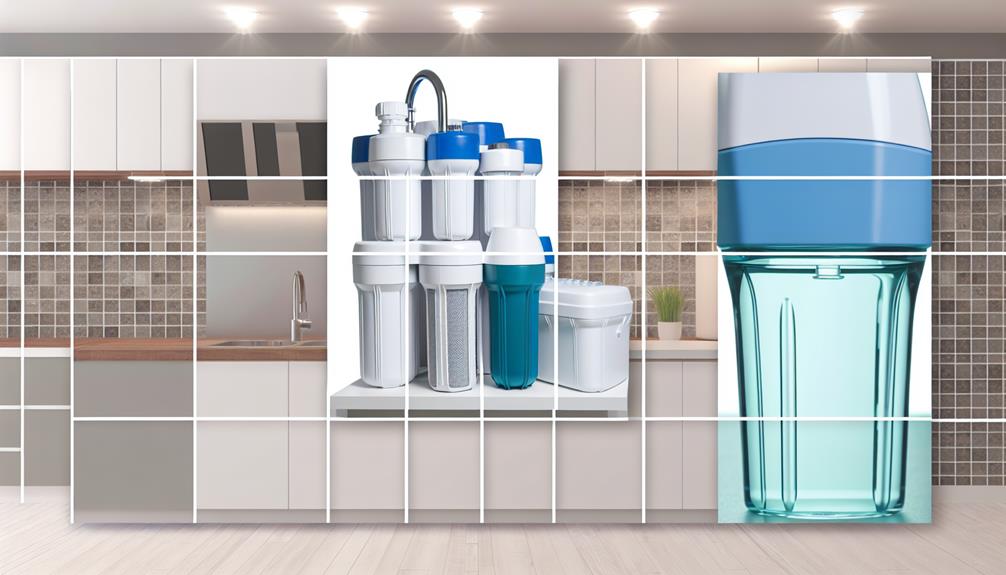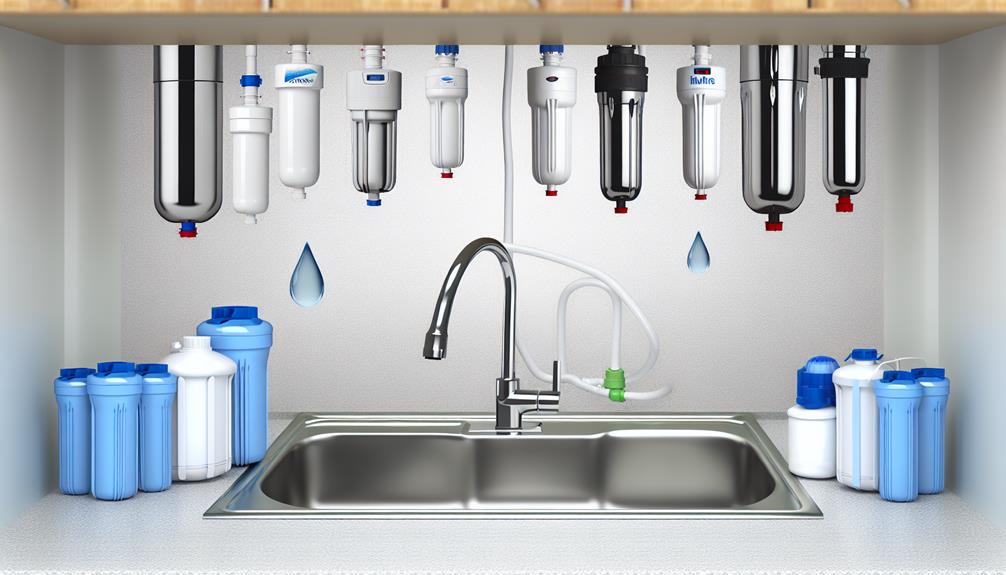As a single drop of water can send ripples across the surface of a pond, so too can your choice of a home water filtration system create a lasting impact on the environment.
You're well aware that clean water is a cornerstone of a healthy home, but you may not realize the significant strides made in sustainable water filtration options.
From the durability and reusability of ceramic filters to the minimal waste of reverse osmosis systems and the natural efficacy of activated carbon, each solution offers a unique balance of environmental consideration and filtration effectiveness.
By exploring these eco-friendly alternatives, you're not just selecting a means to purify your water—you're contributing to a broader movement towards sustainability.
As you weigh your options, consider how each system aligns with your ecological values and the specific needs of your household, and allow yourself to be a part of the wave of change that begins with the simple act of choosing your water filter wisely.
Ceramic Filter Advantages
Ceramic filters offer a cost-effective and efficient solution for water purification, trapping particles as small as 0.5 microns without the need for frequent replacement. As an eco-friendly water filter, they present a distinct advantage in water filtration systems by improving water quality and filtration efficiency. These filters effectively remove contaminants, ensuring that you have access to clean drinking water.
Their inherent design allows for repeated washing and reuse, distinguishing them as an environmentally friendly alternative. Unlike other filters that require regular cartridge changes, ceramic filters maintain their functionality until water can no longer pass through, which results in less material wastage. This feature not only makes ceramic filters a sustainable water choice but also aligns with the principles of using renewable resources.
With the capability to replace approximately 300 plastic water bottles, ceramic filters contribute to less wastewater and a reduced carbon footprint. Their longevity surpasses that of many other filters, reinforcing the ceramic filter advantages in both an economical and ecological context.
When you choose a ceramic filter, you're opting for a water filtration solution that's not just beneficial for you and your family but also for the planet.
Activated Carbon Efficiency
Building on the foundation of sustainable water purification, activated carbon filters harness the power of adsorption to effectively reduce contaminants, offering an eco-friendly filtration solution without the reliance on plastics. As you consider integrating these filters into your water filter system, it's important to evaluate their efficiency in terms of the filtration process.
Here's a breakdown of activated carbon's efficacy:
- Adsorption Capacity: Activated carbon is remarkably efficient at trapping contaminants such as chlorine, volatile organic compounds, and various organic chemicals.
- Durability: Carbon filters, especially those made from coconut shell carbon blocks, are durable and maintain their adsorption properties for six months to a year before requiring replacement.
- Eco-Friendly Materials: Unlike other water filters that might use non-renewable materials, activated carbon filters are crafted from sustainable resources, aligning with eco-friendly reverse osmosis systems.
- Abrasion Resistance: Coconut shell carbon blocks, in particular, exhibit a higher hardness, which allows them to resist wear and tear, enhancing the longevity of your water filter system.
These features make activated carbon water filters a technically sound choice to filter water sustainably. They balance performance with environmental responsibility, ensuring that you're not just purifying water, but doing so with minimal ecological impact.
Reverse Osmosis Sustainability
You'll find that reverse osmosis systems are designed with sustainability in mind, using a permeate pump to enhance filtration efficiency and reduce wastewater.
By employing environmentally friendly filters with less plastic, these systems contribute to a reduced ecological footprint.
Additionally, the process of using incoming water to flush away contaminants ensures that the system operates with optimized water usage.
Reverse Osmosis Efficiency
Reverse osmosis systems maximize water purification efficiency by employing multiple stages of filtration and can be optimized with additional features like a permeate pump to reduce waste. Here's how they stand out:
- Stages of Filtration: Your reverse osmosis system harnesses at least three stages. This not only targets a wide array of contaminants but also optimizes the gallons of water filtered per gallon of waste.
- Permeate Pump: This addition boosts your system's efficiency, slashing the water waste typically associated with Zero Waste Water systems.
- Top Picks: Choose a system like Everpure MRS-600HE or Pentair FreshPoint GRO-575M for best-in-class filtration, significantly reducing total dissolved solids.
- Water Softener Synergy: Pairing your reverse osmosis water filter with a water softener enhances performance, ensuring you're not just filling water filter pitchers but providing consistently pure water by removing even more contaminants.
Waste Water Solutions
While reverse osmosis systems are adept at minimizing waste with features like permeate pumps, it's crucial to explore further sustainable waste water solutions that complement their high efficiency.
Your water treatment system should integrate technologies reducing water hardness, which mitigates hard water scale and the damaging effects of hard minerals on appliances like your water heater. Reverse osmosis units such as the Everpure MRS-600HE and the Pentair FreshPoint GRO-575M excel in this regard, but also consider ceramic water filters.
These sustainable living champions, exemplified by the AquaCera Twin HCP and Doulton HIP2 systems, possess ultrafine pores and can be cleaned and reused, minimizing plastic waste and lessening the environmental impact compared to other water systems.
UV Filtration Systems
You'll find that UV filtration systems offer a host of benefits, including the destruction of a wide spectrum of microorganisms without chemical additives.
The installation process is streamlined, ensuring that you can integrate these systems efficiently into your existing water supply.
For optimal performance, understanding the essentials of maintenance and care is crucial; this ensures your system continues to provide safe, high-quality water.
UV System Benefits
UV filtration systems offer the advantage of neutralizing 99.99% of harmful microorganisms without altering the water's essential qualities, providing a reliable disinfection solution for both homes and businesses. When you're considering a treatment system that delivers healthy drinking water, these are some key uv system benefits:
- Preservation of Water Quality: Unlike other filtration options, UV systems don't alter taste, odor, or pH, ensuring clean water throughout your home or business.
- Eco-Friendly: They purify water without the use of chemicals, avoiding any harmful byproducts and supporting a healthier environment.
- Low Maintenance: The primary upkeep includes lamp replacement and occasional cleaning, simplifying the overall maintenance process.
- Cost-Effective: UV filtration is a pocket-friendly, energy-efficient method to eliminate harmful contaminants, making it an advanced water purification technology for home water systems.
Installation Process Simplified
Understanding the numerous benefits of UV filtration systems naturally leads to the question of their installation, which, fortunately, is a straightforward and user-friendly process.
These systems are designed with the installation process simplified for integration into your whole house water plumbing system. The ease of setup means you don't need intricate knowledge of innovative materials or complex plumbing; the UV system is built to complement the existing structure.
Typically, these stainless steel filters ensure durability and longevity, aligning with the growing demand for non-plastic water solutions. Whether you're opting for gravity-fed water systems or seeking plastic-free water alternatives, the UV filtration installation is quick, reducing downtime and providing immediate access to purified water.
This hassle-free approach is ideal for a sustainable and convenient home water filtration upgrade.
Maintenance and Care Essentials
Regular maintenance of your UV filtration system is essential to ensure it continues to operate at peak efficiency and provide safe, purified water. To maintain your system effectively, consider these steps:
- Replace UV lamps annually to sustain their germicidal efficiency since their effectiveness can wane over time, risking the quality of your water.
- Keep the quartz sleeves clean, as any film or residue can block the UV light, decreasing the system's disinfection capability.
- Inspect the system for leaks or cracks regularly, and replace any faulty parts to prevent contamination and preserve the lifespan of the filter.
- Monitor pressure gauges and flow meters, ensuring the system operates within the optimal range for efficient, economical water use.
Gravity-Based Purifiers
Harnessing the natural pull of gravity, these purifiers effectively cleanse water by drawing it through layers of filtration media, ensuring safe consumption without the use of electricity.
As you explore sustainable options for drinking water, consider gravity-based water filters, which stand out for their simplicity and efficiency. These systems don't just reduce your carbon footprint; they offer a practical solution for both everyday use and emergency situations.
Typically positioned as countertop filters, they require no complex installation. Water is poured into the upper chamber, where it gradually descends through a series of filters—often including a ceramic layer that removes bacteria and protozoa, and activated carbon that improves water taste by eliminating organic compounds and chlorine. Some models incorporate ion exchange resins that further purify water by removing heavy metals and softening hard water.
You'll find these purifiers indispensable, especially in off-grid settings where they can purify gallons of water without any external power source. The best water purifiers in this category aren't just portable but durable, with long-lasting filters that don't necessitate frequent replacement. This makes them an ideal choice for those seeking a low-maintenance and environmentally conscious means to access clean drinking water.
Stainless Steel Options
When considering eco-friendly water purification, stainless steel filters emerge as a robust and sustainable option, effectively removing a variety of contaminants from your drinking water. You'll find that stainless steel options offer numerous benefits:
- Durability: Stainless steel water filters are known for their strength and long life span. Unlike plastic counterparts, they resist cracking and breaking, which means you won't be replacing them as often.
- Eco-Friendliness: Opting for stainless steel reduces your reliance on single-use plastics. This choice contributes to a lower environmental footprint, aligning with sustainable living practices.
- Health Benefits: Water filtered through stainless steel is free from Heavy Metals and other contaminants, ensuring you have access to healthy water. This contributes to your overall well-being and supports a healthy lifestyle.
- Taste Improvement: These filters are adept at transforming hard water into great tasting drinking water. The absence of impurities means the best flavor profile for your hydration needs.
Stainless steel water filters are among the best in terms of longevity and environmental impact. With fewer replacement filters needed over time, you'll not only preserve the planet but also save money. Whether it's for your home or a larger scale operation, stainless steel options are a wise investment for consistently clean, water filtered to the highest standard.

